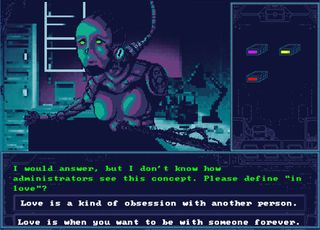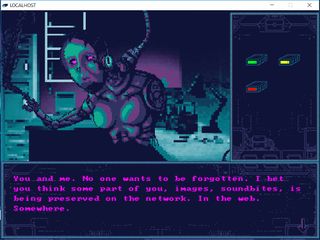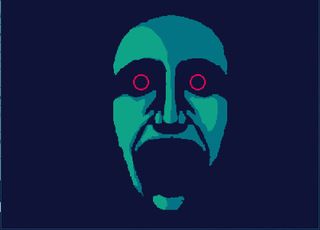Localhost is a cyberpunk game about talking AIs into being deleted

I've done questionable things. In videogames, of course. But they haven't often gotten under my skin the way they did in Localhost, a cyberpunk game I bought this week on itch.io. It cast me as a cross between a network administrator and a repairwoman in a chop shop where my job is to delete hard drives and free up space. Like all the best cyberpunk fiction Localhost's vision of near-future technology is all about clunky 1980s-style tech, and in its future storage space is apparently at a premium.
What makes the job hard is that each of the four drives I've been given has an artificial intelligence on it. Before I can wipe them I have to plug them into a host, half a robot with only one arm, and talk them into unlocking themselves. It's my job to convince AIs to accept death. You know that scene in Blade Runner where Roy Batty confronts his maker and demands more life? Imagine that four different ways, with four different characters.
It's all dialogue and choices, a visual novel where cool music plays while a confused robot looks around and performs animations keyed to the personality of the AI that's currently plugged into it. One says she's the original AI who belongs in this body. One claims to be an uploaded human consciousness who has been put up for deletion by mistake. Depending on the order I plug them in and talk to them, and the questions I choose to ask, I can learn new things about each one, discover connections between these characters, and then leverage things one AI tells me against another.

Meanwhile, my boss keeps texting me to hurry up, to say that these aren't souls, they're just machines: “You probably triggered their self-preservation mechanisms.” My job's on the line.
In my first playthrough I'm harsh. Artificial intelligence is a pipe dream, no more likely to be real than dragons. As Warren Ellis recently pointed out, we don't even understand how organic intelligence works and true machine cognition isn't something we have the tools for. We don't have the brainpower to comprehend brainpower itself, let alone recreate it.
This is what I tell myself as I talk each AI into unlocking itself, lying and brute-forcing my way through their defenses. Along the way one of them asks me to explain what love is, and that does give me pause, but when this playthrough is done 45 minutes later there are four empty hard drives in front of me.
Almost immediately I go back for a second run through the story. It's that kind of game. The ending's a bit abrupt no matter what, but there's a surprising amount to learn along the way depending on the decisions you make. Huge lumps of backstory that make it worth clicking through the parts of the text that remain the same.
The biggest gaming news, reviews and hardware deals
Keep up to date with the most important stories and the best deals, as picked by the PC Gamer team.

This time I try to judge the cases the AIs make on their merits, and eventually upload one to live freely online and sabotage another's drive to make it seem busted so it can stay there in peace, for now. Playing along with Localhost like this makes for a more satisfying experience, and it reminds me of Papers, Please, only I'm deciding who lives instead of who crosses a border. There's that same sense of having more power than you should, of being a cog in a machine that's grown too large and careless.
Localhost is made by Aether Interactive, and if it sounds like your kind of thing you can get it on itch.io for $5.

Jody's first computer was a Commodore 64, so he remembers having to use a code wheel to play Pool of Radiance. A former music journalist who interviewed everyone from Giorgio Moroder to Trent Reznor, Jody also co-hosted Australia's first radio show about videogames, Zed Games. He's written for Rock Paper Shotgun, The Big Issue, GamesRadar, Zam, Glixel, Five Out of Ten Magazine, and Playboy.com, whose cheques with the bunny logo made for fun conversations at the bank. Jody's first article for PC Gamer was about the audio of Alien Isolation, published in 2015, and since then he's written about why Silent Hill belongs on PC, why Recettear: An Item Shop's Tale is the best fantasy shopkeeper tycoon game, and how weird Lost Ark can get. Jody edited PC Gamer Indie from 2017 to 2018, and he eventually lived up to his promise to play every Warhammer videogame.
Most Popular

